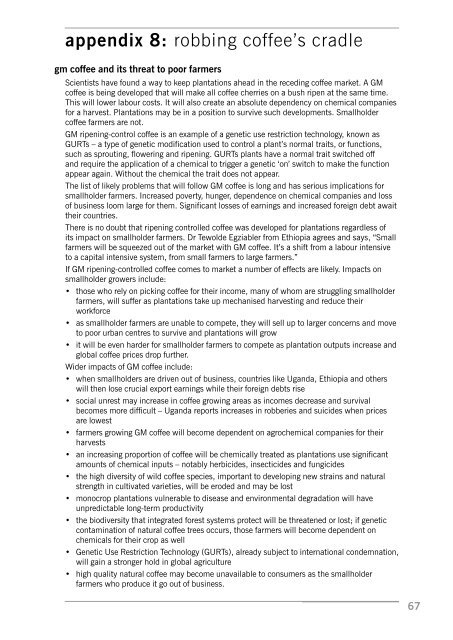Cost of coffee.indd - RISC
Cost of coffee.indd - RISC
Cost of coffee.indd - RISC
You also want an ePaper? Increase the reach of your titles
YUMPU automatically turns print PDFs into web optimized ePapers that Google loves.
appendix 8: robbing c<strong>of</strong>fee’s cradle<br />
gm c<strong>of</strong>fee and its threat to poor farmers<br />
Scientists have found a way to keep plantations ahead in the receding c<strong>of</strong>fee market. A GM<br />
c<strong>of</strong>fee is being developed that will make all c<strong>of</strong>fee cherries on a bush ripen at the same time.<br />
This will lower labour costs. It will also create an absolute dependency on chemical companies<br />
for a harvest. Plantations may be in a position to survive such developments. Smallholder<br />
c<strong>of</strong>fee farmers are not.<br />
GM ripening-control c<strong>of</strong>fee is an example <strong>of</strong> a genetic use restriction technology, known as<br />
GURTs – a type <strong>of</strong> genetic modification used to control a plant’s normal traits, or functions,<br />
such as sprouting, flowering and ripening. GURTs plants have a normal trait switched <strong>of</strong>f<br />
and require the application <strong>of</strong> a chemical to trigger a genetic ‘on’ switch to make the function<br />
appear again. Without the chemical the trait does not appear.<br />
The list <strong>of</strong> likely problems that will follow GM c<strong>of</strong>fee is long and has serious implications for<br />
smallholder farmers. Increased poverty, hunger, dependence on chemical companies and loss<br />
<strong>of</strong> business loom large for them. Significant losses <strong>of</strong> earnings and increased foreign debt await<br />
their countries.<br />
There is no doubt that ripening controlled c<strong>of</strong>fee was developed for plantations regardless <strong>of</strong><br />
its impact on smallholder farmers. Dr Tewolde Egziabler from Ethiopia agrees and says, “Small<br />
farmers will be squeezed out <strong>of</strong> the market with GM c<strong>of</strong>fee. It’s a shift from a labour intensive<br />
to a capital intensive system, from small farmers to large farmers.”<br />
If GM ripening-controlled c<strong>of</strong>fee comes to market a number <strong>of</strong> effects are likely. Impacts on<br />
smallholder growers include:<br />
• those who rely on picking c<strong>of</strong>fee for their income, many <strong>of</strong> whom are struggling smallholder<br />
farmers, will suffer as plantations take up mechanised harvesting and reduce their<br />
workforce<br />
• as smallholder farmers are unable to compete, they will sell up to larger concerns and move<br />
to poor urban centres to survive and plantations will grow<br />
• it will be even harder for smallholder farmers to compete as plantation outputs increase and<br />
global c<strong>of</strong>fee prices drop further.<br />
Wider impacts <strong>of</strong> GM c<strong>of</strong>fee include:<br />
• when smallholders are driven out <strong>of</strong> business, countries like Uganda, Ethiopia and others<br />
will then lose crucial export earnings while their foreign debts rise<br />
• social unrest may increase in c<strong>of</strong>fee growing areas as incomes decrease and survival<br />
becomes more difficult – Uganda reports increases in robberies and suicides when prices<br />
are lowest<br />
• farmers growing GM c<strong>of</strong>fee will become dependent on agrochemical companies for their<br />
harvests<br />
• an increasing proportion <strong>of</strong> c<strong>of</strong>fee will be chemically treated as plantations use significant<br />
amounts <strong>of</strong> chemical inputs – notably herbicides, insecticides and fungicides<br />
• the high diversity <strong>of</strong> wild c<strong>of</strong>fee species, important to developing new strains and natural<br />
strength in cultivated varieties, will be eroded and may be lost<br />
• monocrop plantations vulnerable to disease and environmental degradation will have<br />
unpredictable long-term productivity<br />
• the biodiversity that integrated forest systems protect will be threatened or lost; if genetic<br />
contamination <strong>of</strong> natural c<strong>of</strong>fee trees occurs, those farmers will become dependent on<br />
chemicals for their crop as well<br />
• Genetic Use Restriction Technology (GURTs), already subject to international condemnation,<br />
will gain a stronger hold in global agriculture<br />
• high quality natural c<strong>of</strong>fee may become unavailable to consumers as the smallholder<br />
farmers who produce it go out <strong>of</strong> business.<br />
67




